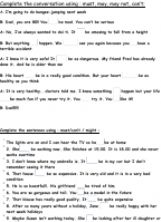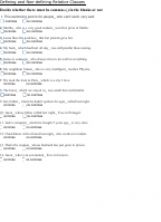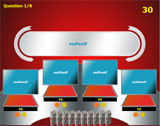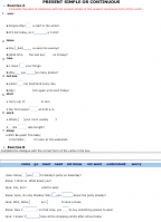
Someone, anyone, no one, somebody, anybody, nobody
My students have some difficulties dealing with this grammar topic, so I prepared the ws to help them understand and practice it. Hope you find it useful! Cheers from sunny Brazil!
Level: intermediate
Age: 13-17
Type: worksheet

Much, Many, A lot of
Students can practice the use of much, many and a lot of. There are three different activities and vocabulary related to food.
Level: elementary
Age: 11-17
Type: worksheet

The Indefinite Article: A or AN
Match and rewrite with A or AN.
Level: elementary
Age: 9-17
Type: worksheet

Must or mustn�t
Ss look at the picture and write sentences with must or mustn�t
Level: elementary
Age: 7-14
Type: worksheet

Present Simple or Past Simple
This worksheet focuses on the difference between present simple and past simple. On the top of it there is an explanation on the uses of these two verb tenses and the most common words that go with each of them. I hope it may be useful! Hugs!
Level: intermediate
Age: 11-17
Type: worksheet

BEEN OR GONE?
Worksheet to practise the difference between "been to" and "gone to". Students read the brief grammar explanation and then fill in the blanks in the sentences with "been" or "gone". I hope you like it and find it useful.
Level: elementary
Age: 12-14
Type: worksheet

Indefinite articles: a or an?
Kids read the rule and write a or an according to the words given - 5 categories: animals, people, food, fruit, objects. A very simple worksheet for beginners or for older students who need to revise this grammar topic. Thank you so much for your wonderful comments on my worksheets. I really appreciate them all. Have a nice Friday. Hugs, mena:))))
Level: elementary
Age: 7-11
Type: worksheet

MUCH - MANY - A LOT OF *poster + exercises* (B&W + KEY included)
A grammar-guide poster on MUCH, MANY, A LOT OF and a gap filling exercise. B&W version and KEY included. Hope U find it useful. Have a nice Wednesday. Hugs mada :)
Level: elementary
Age: 9-17
Type: worksheet

REGULAR OR IRREGULAR
This worksheet is designed to revise some "Simple Past Tense" and "Regular and Irregular Verbs" Students have to fill in the blanks with the past simple of one of the verbs in the boxes. Pictures will help the studens find the verbs easily.(Students must be careful they can be regular or irregular. ENJOY;)
Level: elementary
Age: 12-17
Type: worksheet

conjunctions ( and, or, but )
Hope u like it.
Level: elementary
Age: 9-12
Type: worksheet

PAST SIMPLE OR PRESENT PERFECT SIMPLE?
Past Simple - Present Perfect Simple
Level: intermediate
Age: 12-17
Type: worksheet

Country or City?
Reading about the growth of big cities due to the movement from small villages to urban areas. The comprehension activities include true/ false and answering questions. The grammar topics are: future with will, going to, may/ might; rephrasing with linkers of contrast and if-clauses (first and second conditional). In the writing activity students h...
Level: intermediate
Age: 13-14
Type: reading

Present Simple or Continuous?
Students complete the sentences with the present simple or the present continuous of the verbs in brackets and then match the sentences with the pictures. Explanation of the use and form of these tenses + exercises: http://www.eslprinta bles.com/printable.a sp?id=210013#thetop
Level: elementary
Age: 12-14
Type: worksheet

a PUZZLING story, or story in PUZZLES (part 2)
A story just like a previous one, to be cut into 18 pieces and given out to the students. All the extra ideas included in the ws. Still, there can be lots of variants what to do with the story. Hope you find it useful! Life_line
Level: elementary
Age: 8-17
Type: worksheet

"WILL OR GOING TO?" -FUTURE FORM
"WILL OR GOING TO?" - Students must complete the sentences with the Future form with �WILL OR GOING TO� of the verbs in brackets. Then they must match the sentences with the pictures.This worksheet has the same contents and pictures as the one I uploaded and then deleted due to the confusion because of the layout(I hope there is no problem with thi...
Level: intermediate
Age: 12-17
Type: worksheet
|

BRITISH VS AMERICAN ENGLISH
TEST YOUR KIDS ON THE DIFFERENCE BETWEEN BRITISH AND AMERICAN.
IT�S A NICE WAY TO HAVE FUN AND INTRODUCE LANGUAGE DIFFERENCES.
Level: intermediate
Age: 12-17
Format: PowerPoint

Active or Passive? Present, Past, Future Simple. Drill exercises.
Three sets of exercises: 1)Choose the correct verb form. 2)Put the verbs in brackets into the correct form.3) Open the brackets using Present, Past or Future Simple Passive.(The keys included).Enjoy!!!
Level: intermediate
Age: 12-14
Format: PowerPoint

Fame or Shame? #1
Fame or shame? Is it good to be known all over the world? Why do famous people become angry when they�re chased and photographed all the time, if all they seek is fame and recognition? Use this and see how your pupils would deal with fame if they were big personalities.
(W hen showing the first slides with the news I usually add Lady Gaga�s song...
Level: intermediate
Age: 12-17
Format: PowerPoint

For or Since
since or for game.Hope you like it
Level: intermediate
Age: 4-17
Format: PowerPoint

ARTICLES "A" or "AN"
Students have to decide whether to put "a" or "an" in front of the words.
Level: elementary
Age: 6-17
Format: PowerPoint

WHEN OR BECAUSE? - GAME ( 2)
Thank you:-)
Level: intermediate
Age: 12-14
Format: PowerPoint

MAKE OR DO 2
MAKE YOUR BED!
I WILL DO THE DISHES!
Level: intermediate
Age: 12-17
Format: PowerPoint

-ING OR INFINITIVE: SPECIFIC CASES OF USE
Hello!
I prepared a short ppt concerned with gerunds & infinitives. It contains model sentences along with brief explanations. Suitable for intermediate and advanced levels. (Images taken from Word Clip arts Gallery).
Have a nice weekend.
Level: advanced
Age: 14-17
Format: PowerPoint

Scrabble - Minions for young learners
To be used with a projector and whiteboard. When the students go through a DW etc, click on the DW to remove it to enable the students to write the word on the whiteboard more easily. To encourage young learners to play Scrabble and remember spellings... they can spell any word as long as it joins another word. I don�t give them squares with letter...
Level: elementary
Age: 6-10
Format: PowerPoint

St Patricks Day
I have used this powerpoint for an assembly
Level: elementary
Age: 3-9
Format: PowerPoint

British English vs American English game
I used it in class in form of a game to check how well my students remembered BE and AE words.
Level: intermediate
Age: 7-100
Format: PowerPoint

PART 1: past continuous or past simple
This power point is in two parts because of its size...sorry.It�s to help stunendts to undersatand the past continuous concept , but with laughter.The second part had the grammar definition and some more cartoons to try themselves without any prompts.
Enjoy
;o)
Level: intermediate
Age: 14-17
Format: PowerPoint

WHEN OR BECAUSE? - GAME ( 1)
Thank you :-)
Level: intermediate
Age: 13-14
Format: PowerPoint

LEND OR BORROW
GREAT EXERCISE TO INTRODUCE OR REVIEW HOW TO USE THESE TWO CONFUSING VERBS. RULES ARE EXPLAINED AND THE OPPORTUNITY TO PARCTICE THROUGH AN ATTRACTIVE EXERCISE. I HOPE YOU LIKE IT!!
Level: intermediate
Age: 8-17
Format: PowerPoint

Present Perfect or Past Simple
This PowerPoint helps my students to revise the uses of both tenses in all their structures: Affirmative, negative and interrogative.
Level: intermediate
Age: 14-100
Format: PowerPoint
|

MODAL VERBS: POSSIBILITY OR PROBABILITY
The student has to wirte the correct modal verb in each situation
Level: intermediate
Age: 12-100

Defining and Non-defining Relative Clauses - Comma(s) or No Comma(s)
Use comma(s) if it�s a non-defining relative clause and do not use comma(s) if it�s a defining relative clause. You may want to revise the topic before you do this exercise. Enjoy!
Level: intermediate
Age: 14-100

phonics and spelling -er / -or
words ending with -er / -or
Level: elementary
Age: 7-9

Present perfect or past simple?
This is an exercise with 10 questions you can use to test if you understood when to use present perfect and when to use past simple. Hope it will be useful for you! =)
Level: intermediate
Age: 14-100

LI85: like or alike
The difference between like, alike, dislike, unlike
Level: intermediate
Age: 14-100

Count or Non count nouns
Identifying count or non count nouns
Level: intermediate
Age: 12-100

Too or Very. Too Much or Too Many LI48
Choose between too or very.
Level: intermediate
Age: 14-100

To or For LI80
Practicing using to or for for Intermediate students.
Level: intermediate
Age: 14-100

Computers
Computer technology
Level: elementary
Age: 3-100

Present Simple or Present Continuous Game
A fun game to practise the difference between the present simple and the present continuous.
Level: elementary
Age: 12-100

English Program - My Skeleton (a)
English Program - My Skeleton (a)
Level: elementary
Age: 5-6

Gerund or Present Participle?
-ing form for gerunds and present participles
Level: intermediate
Age: 14-100

Present Simple or Present Continuous
Learners must find if sentences are present simple or present continuous
Level: elementary
Age: 9-14

too or enough
Too or enough /not enough
Level: elementary
Age: 10-14

PRESENT SIMPLE OR CONTINUOUS
Intermediate level exercises to compare present simple and continuous. I hope you like it.
Level: intermediate
Age: 11-100
|